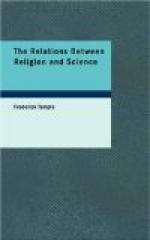To this it must be added that the action of the will is such that it very often happens that, having been exerted once, it need not be exerted again for the same purpose. A custom is broken down, an exceedingly strong temptation has been overpowered, and its strength so destroyed that its return is without effect. Or sometimes the act of the will takes the form of deliberately so arranging the circumstances of life that a dreaded temptation cannot return, or if it return cannot prevail; the right eye has been plucked out, the right hand cut off, and the sin cannot be committed even if desired. While therefore the will is always free, the actual interference of the will with the life is not so frequent as to interfere with the broad general rule that the course of human conduct is practically uniform. In fact the will, though always free, only asserts its freedom by obeying duty in spite of inclination, by disregarding the uniformity of nature in order to maintain the higher uniformity of the Moral Law. The freedom of the human will is but the assertion in particular of that universal supremacy of the moral over the physical in the last resort, which is an essential part of the very essence of the Moral Law. The freedom of the will is the Moral Law breaking into the world of phenomena, and thus behind the free-will of man stands the power of God.
When the real claim of the will for freedom has been clearly seized by the mind, it becomes apparent that there is no real collision between what Science asserts and what Religion requires us to believe. Science asserts that there is evidence to show that an exceedingly large proportion of human action is governed by fixed law. Religion requires us to believe that the will is responsible for all this action, not because it does, but because it might interfere. Science is not able, and from the nature of the case never will be able to prove that the range of this fixed law is universal, and that the will never does interfere to vary the actions from what without the will they would have been. Science will never be able to prove this, because it could not be proved except by a universal induction, and a universal induction is impossible. At present there is no approximation to such proof. Religion, on the other hand, does not call on us to believe that the will often interferes, but on the contrary is perpetually telling us that it does not interfere as often as it ought. Revealed religion, indeed, has always based its most earnest exhortations on the reluctance of man to set his will to the difficult task of contending with the forces of his nature, and on the weakness of the will in the presence of those forces.




